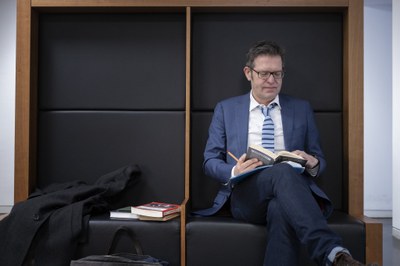Paper borders separate people out

Prof. Dr. Steffen Mau, Photo: Matthias Heyde
With Sortiermaschinen (“Sorting Machines”), Steffen Mau has written a book about reinventing the border in the 21st century. In it, he shows how borders and border controls are being reconstructed under the conditions of globalisation. Border fences, the relocation of controls and smart borders are causing people to be increasingly subjected to sorting logics.
After national borders seemed to be opening up with globalisation, new physical fortifications emerged, but also walls of paper and data. These exclude people, drive people back and filter between the welcome and the unwelcome. As a result, for people in Africa, Asia or South America, mobility is often a privilege that they have to fight hard for, while people in Western societies simply get it.
People are dependent on globalised border regimes
This can be seen, for example, at the external borders of the EU. There are huge camps there where people live under extremely precarious circumstances – for example, in Moria in Greece. The catastrophic situation in Afghanistan – and specifically in Kabul – also shows how much people who want to leave the country are dependent on globalised border regimes that enforce territorial control and selectivity. They are victims of powerful sorting machines and are immobilised, as it were. For example, although they are supposed to get visas quickly, the bureaucracy hinders the necessary, and actually easy-to-implement, mobility.
More can be read about this in the following interview. In it, the Leibniz Prize winner and highly regarded macrosociologist explains his latest research results:
Read the interview with Steffen Mau
Prof. Dr Steffen Mau works at the Department of Social Sciences at the Humboldt-Universität zu Berlin as head of the Macrosociology division. His book Sortiermaschinen. Die Neuerfindung der Grenze im 21. Jahrhundert (“Sorting Machines. Reinventing the Border in the 21st Century”) is available from 26th August from the publisher C.H. Beck: paperback with French flaps, 189 pages with five illustrations, € 14.95.
Press contact
Hans-Christoph Keller
Press Spokesperson of the Humboldt-Universität zu Berlin
